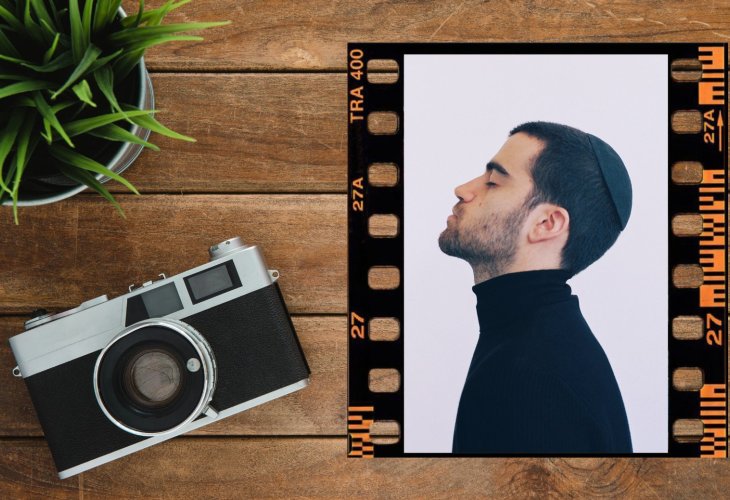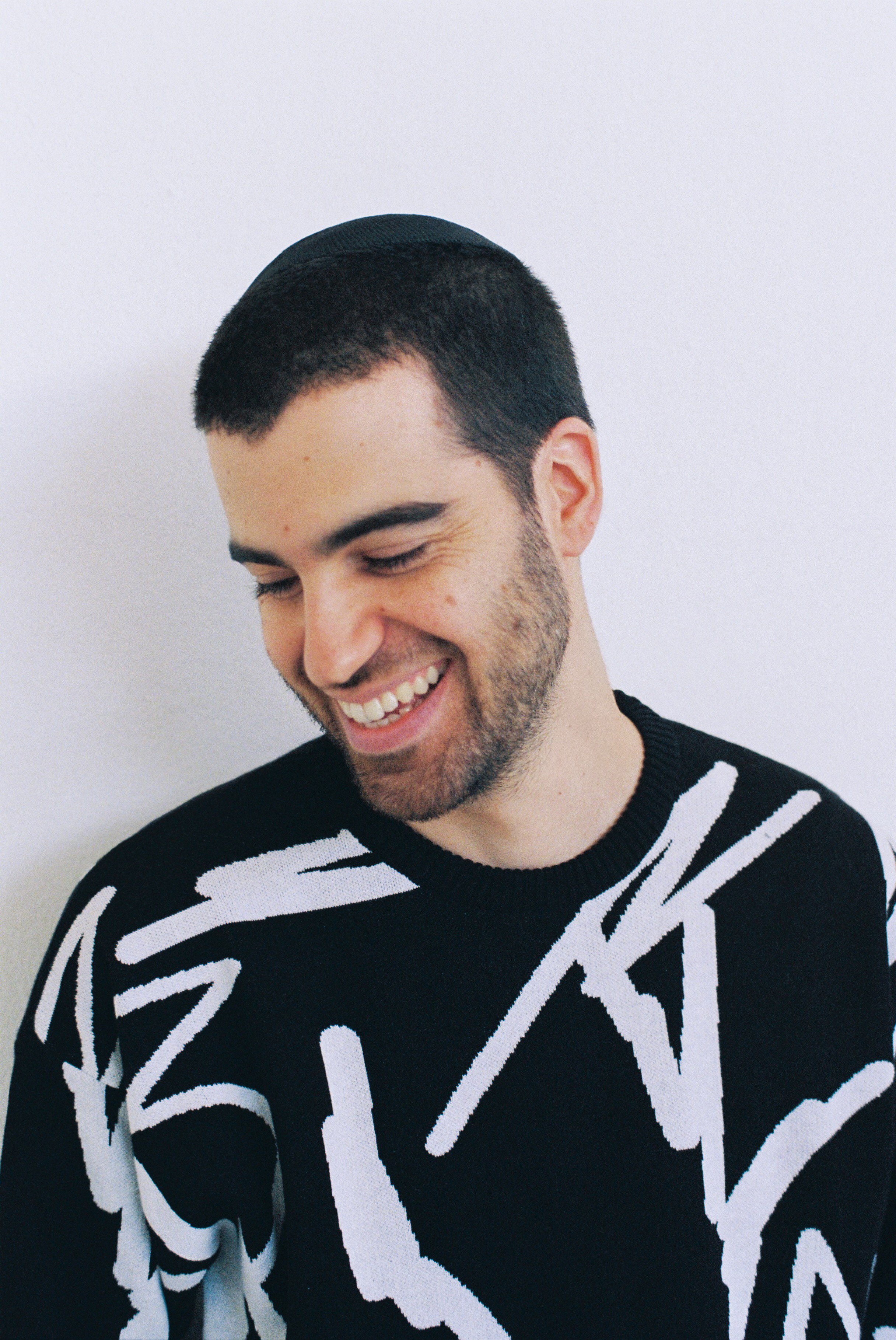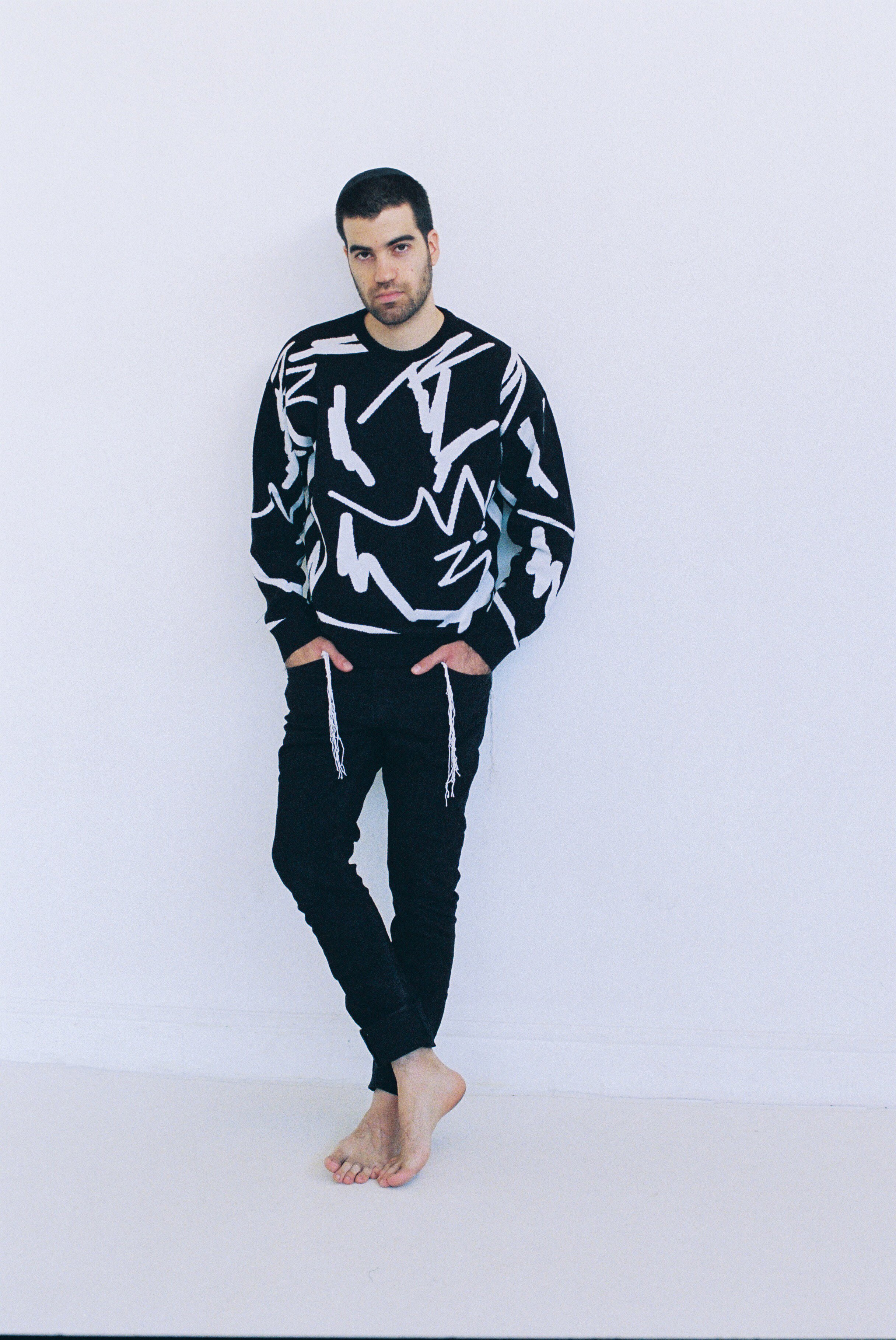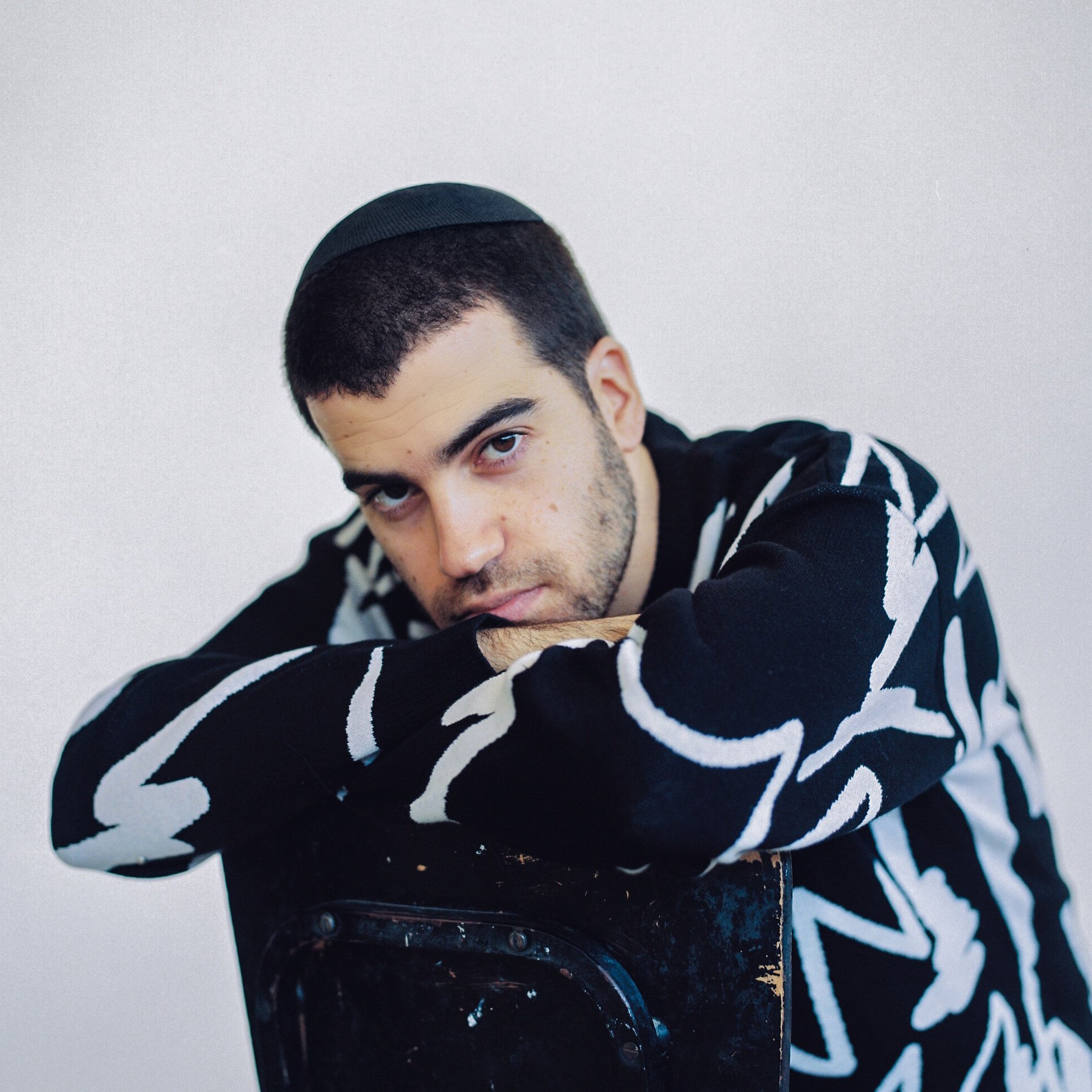Top Photographer: "I Felt That If I Photographed Immodestly, I Wouldn't Be Able to Sleep at Night"
Top photographer Tal Avudi has worked with Israel's most prestigious agencies and made a name abroad, but unlike other photographers, Tal aims to sanctify modesty—and it's working.
 Photo: Daniel Zakont
Photo: Daniel ZakontTal Avudi (27), married and father to three daughters, grew up in a typical secular home in Petah Tikva. At age 10, his father unexpectedly became religious, a decision that shook the household. "My father is in real estate," he recounts, "One day, just before closing a big deal, his client insisted on getting approval from Rabbi Chaim Cohen, tzadik ha'alban zt"l. He took my father along, and from there things started to unfold."
How did you react to the change?
"We were in total shock. As a child attending a secular school, I was embarrassed when my father suddenly arrived with a kippah on his head. I had an inexplicable aversion to religion, and his return to faith shook our home quite a bit."
What about the rest of your family?
"My mother returned to religion later. Dad tried to enroll my siblings and me in religious institutions, but we refused, and Mom stood by us. Generally, I think we should approach kids of religious returnees with delicacy, not coercion, so they can understand the goodness of this light themselves. I think if I had gone to a religious school back then, I wouldn’t be where I am today."
Despite his aversion to religion, Tal began observing Shabbat when he reached bar mitzvah age, with his mother joining him. "I still didn’t understand the significance of keeping Shabbat; it didn’t come from that place. I was a very anxious child and something happened to me. I told myself that if I got through it, I would start keeping Shabbat, and that's what happened. Over the years, my genuine love for Shabbat developed."
 Photo: Daniel Zakont
Photo: Daniel Zakont"Photography Lifted Me as an Insecure Kid"
At 18, Tal enlisted in the army, surprisingly entering the military rabbinate. "Hashem just guided me, it was strange. I had no religious symbols, no kippah, I just kept Shabbat. At my secular school, I was considered very religious, and suddenly, at the military rabbinate, I saw rabbis, religious soldiers, those who pray three times a day and bless, and I realized the tremendous gap between us, a gap I had to close. Indeed, I started praying, saying blessings, wearing a kippah. There, I really managed to strengthen and understand that I am religious. I believe Hashem placed me there to receive a serious boost."
Despite his faith, Tal didn't abandon his great love for fashion—a love that began in high school. "I was an insecure kid and loved fashion very much. I started photography, and it was my escape. I uploaded the photos on social media and began receiving lots of positive feedback, which really boosted my confidence."
Tal built his reputation as a photographer, and his confidence began to soar. During his military service, major agencies in Israel approached him to take photos for them. He agreed, but he still did it as a hobby, even though he realized he could succeed in the civilian field.
A few months before his discharge, Tal began thinking about what to do after his service. "I tried to understand how I could continue photographing, as I had really strengthened. I thought this hobby wasn’t quite suitable for a religious person and that maybe I should let it go."
Did you let it go?
"For a period, yes. I decided to try working with my father in real estate. Very quickly, I realized I had no connection, no connection, or understanding of the field. It made me rethink my path. I saw my friends taking a year off and traveling abroad, so I decided I would also take an experimental period with photography, but on my terms—in modesty—to see if it even works in the secular world."
 Photo: Daniel Zakont
Photo: Daniel Zakont
"I'm Trying to Prove It Can Be Done Differently"
Tal photographed for several major agencies during his trial period and hasn’t stopped since, confident in his new path. However, the fashion world had mixed opinions. "Many accepted it and said it didn't matter at all, while others told me that I’m too good a photographer and that these rules I set only block me. I admit there were several magazine covers canceled, or major campaigns taken off the table because of modesty issues, but I felt I received a gift from Hashem, and such a gift can't be ruined."
Yet, you were still single, fresh in the world of faith. Didn’t you consider abandoning your principles for fame?
"No. I felt that if I photographed immodestly, I would ruin the gift Hashem gave me. I wanted to sleep peacefully at night and not think if I led people astray with immodest things. I decided to use my talent to sanctify and strengthen modesty. I wanted to show it’s possible to photograph top models at the highest level, all while maintaining modesty."
The fashion world is very competitive and tough. How did you manage to integrate into it?
"At first, I was afraid I’d have to adapt myself to this world, but then I realized Hashem is paving my way, so I believed in myself. I didn’t try to change, I didn’t have an ego, I was still the shy and nice person, and with Hashem’s blessing, I got jobs. I prayed and asked Hashem to guide me to projects that were right for me, at the right time, and I truly felt He listened and helped me."
What about abroad? How were you received there?
"Abroad, there’s actually more acceptance of modest fashion. In Israel, there’s a tendency to fear the religious look, that a celebrity shouldn’t appear too religious, whereas abroad everything is open. What surprised me in Israel was that I was supposed to shoot several women-only magazine covers, and I was told it couldn’t work if the celebrity dressed modestly. I didn’t understand why a cover needs to be revealing to sell, and also—if it’s a magazine for women, why can’t you sell a cover with a stunning and modest picture? It shouldn’t be an issue at all. I’m trying to prove it can be done differently."
 Photo: Daniel Zakont
Photo: Daniel Zakont
"In a Demanding World, I Needed a Home to Return To"
Today, seven years in the profession, Tal is married to Eden, a teacher by profession and a father to three daughters, living in Petah Tikva. Immediately after his army discharge, it was clear he wanted to establish a Jewish home, though he had no idea where to find a suitable match. His father stepped in to help. "My father took the reins and signed me up for several religious dating sites. I lived in a secular environment and didn’t really know where I could meet religious women. Luckily, I met my wife, and we married after five months."
Why did you want to marry so quickly after being discharged?
"I was focused on developing a career but knew I had to find my wife first. I understood that if I entered such a demanding world, I needed a home to return to, to have a foundation, so I wouldn’t be drawn into a world I didn’t want to be in."
Some returning to religion consider leaving their career post-teshuva. From your experience, what would you recommend?
"I think anyone can turn something into a spiritual endeavor. For example, my wife wants to start writing, to be an author, so if she writes a sort of novel, she has a choice between writing immodest things or incorporating the morals of Judaism, even subtly. You just need to choose the path where you integrate Hashem. However, I wouldn’t recommend other religious people enter the fashion world; I don’t think everyone can handle the challenges and what this world demands, but anyone can find what they love and bring Hashem into it."
Just before the coronavirus crisis began, Tal experienced a significant breakthrough abroad. "I had a few huge projects lined up, both in terms of exposure and budgets," he shares. But then COVID-19 hit, and Tal fell into deep depression. He returned from the US to two weeks of isolation, which turned into two months of depression, during which he secluded himself in his room. "The last time I was in New York was in March. I had some important jobs, but when I realized COVID-19 was breaking out, I advanced my flight. When I returned to Israel, I sunk into deep depression. I knew deep inside that all was for the best, that it wasn’t yet my time to reach the goals I had dreamed of achieving. I experience this struggle in my daily life, but I needed to really live it. I started listening to a lot of lectures on faith to instill this mantra in myself that everything truly happens for the best. I told myself, 'Relax, what is meant for you will come at the right time,' and it really helped. There isn’t a day I don’t listen to lessons about faith, and I don’t understand how people live without it. For me, it’s the foundation. You have to prepare yourself mentally for daily struggles and you need strong faith, something to hold onto. I know I've never fallen as low as I did during this pandemic. I suffered from anxiety, depression, entire days spent not getting out of bed, not wanting to work. I didn’t know what was happening to me. But I truly believe it’s a process we are going through and that everything is for the best. There is a global change happening here. There is no place COVID-19 hasn’t reached and nowhere we can escape to. It's everywhere and it has never happened before. This only strengthens my belief that there is a beginning of redemption, and that’s actually my consolation."

